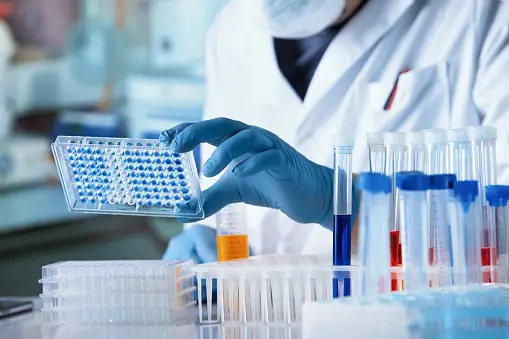BVoc MLT

Course Summery
The 3-year degree program in Medical Laboratory Technology (MLT) offers an in-depth education in the field of laboratory sciences. Students receive comprehensive training in clinical chemistry, hematology, immunology, microbiology, and other key areas. Through a combination of theoretical coursework and hands-on practical experience, students develop the necessary skills to perform a wide range of laboratory tests and analyses. The program also emphasizes laboratory safety, quality assurance, and ethical practices. In the final year, students participate in a clinical practicum, gaining valuable real-world experience in a medical laboratory setting. Upon graduation, students are well-prepared to enter the workforce as competent and knowledgeable MLT professionals, ready to contribute to the healthcare industry by providing accurate and timely laboratory information for patient care and diagnosis.
Practical Training:
Practical training is a fundamental component of a degree program in Medical Laboratory Technology (MLT). It provides students with hands-on experience in a real-world laboratory setting, allowing them to apply the theoretical knowledge they have acquired throughout their coursework. Practical training is typically conducted during the final year of the program and is often referred to as a clinical practicum or internship.
The curriculum in Medical Laboratory Technology (MLT) is designed to provide students with a comprehensive understanding of laboratory sciences and the skills necessary to excel in the field. The curriculum encompasses a wide range of subjects, including anatomy and physiology, clinical chemistry, hematology, immunology, microbiology, and molecular diagnostics. Students receive a blend of theoretical knowledge and practical training, with an emphasis on laboratory safety, quality assurance, and ethical practices. Throughout the program, students gain hands-on experience through laboratory experiments, simulations, and a clinical practicum, where they apply their knowledge in a real-world setting. The curriculum aims to equip students with the necessary technical skills, critical thinking abilities, and professional attributes to succeed as MLT professionals and contribute to healthcare by providing accurate and reliable laboratory information for diagnosis, treatment, and prevention of diseases..
Career Opportunities:
A degree in Medical Laboratory Technology (MLT) opens up a variety of career opportunities in the healthcare industry. Here are some potential career paths for MLT graduates.
- Medical Laboratory Technologist/Technician: MLT graduates can work as medical laboratory technologists or technicians in hospitals, clinics, diagnostic laboratories, and research facilities. They perform a wide range of laboratory tests, analyze samples, and generate accurate reports that assist in disease diagnosis, treatment monitoring, and prevention.
- Clinical Laboratory Scientist: With further education and experience, MLT professionals can advance to become clinical laboratory scientists. They often specialize in a specific area of laboratory science, such as clinical chemistry, hematology, or microbiology. Clinical laboratory scientists have additional responsibilities, including complex test interpretation, quality control, research, and management roles.
- Laboratory Supervisor/Manager: MLT professionals with leadership skills and experience may pursue supervisory or managerial positions in clinical laboratories. They oversee laboratory operations, manage laboratory staff, ensure compliance with regulations, and coordinate workflow to maintain efficiency and quality.
- Research Assistant: MLT graduates can work as research assistants in medical research laboratories, assisting scientists and researchers in conducting experiments, analyzing data, and contributing to scientific discoveries. They may be involved in areas such as molecular biology, genetics, or immunology.
- Public Health Laboratories: MLT professionals can work in public health laboratories, where they play a crucial role in monitoring and controlling infectious diseases, conducting screenings, and analyzing population health data. They may be involved in surveillance programs, outbreak investigations, and ensuring the safety of the community.
- Education and Research: MLT professionals with advanced degrees can pursue teaching positions in MLT programs or work as instructors in medical laboratory science education. They may also contribute to research in the field, exploring new laboratory techniques, developing protocols, and advancing scientific knowledge.
Course Features
- Duaration : 3 years
- Eligibility : + 2
- Students : 50
To know more about the course and admission details, you can talk with our counselor.